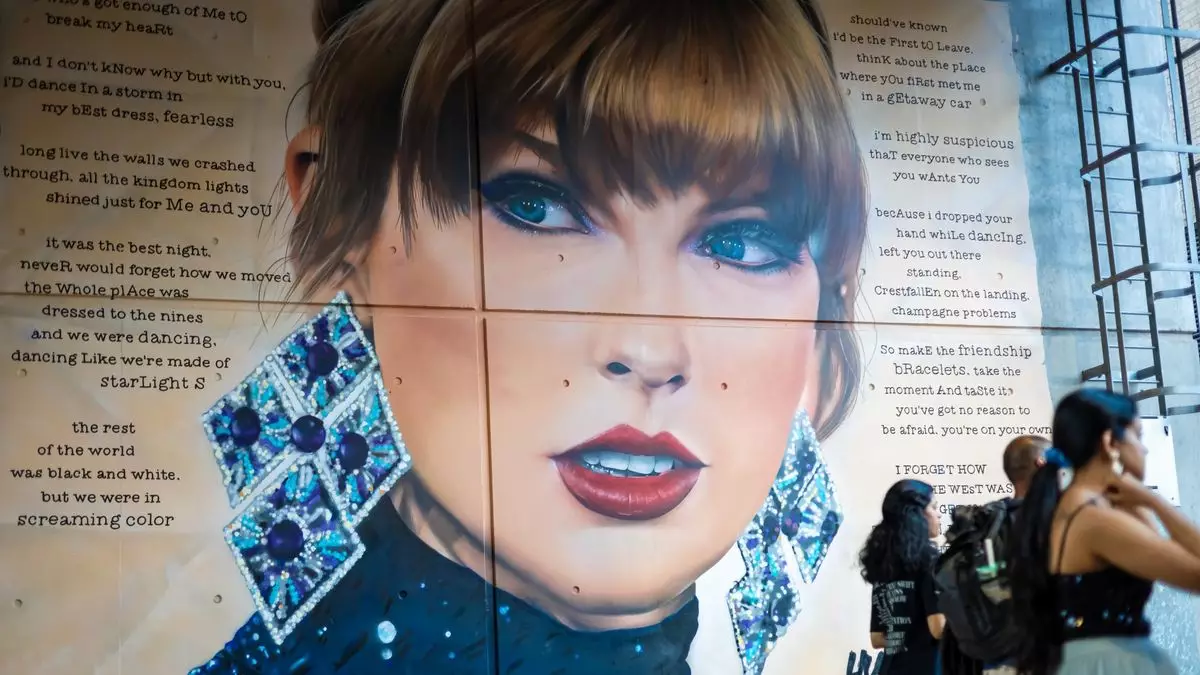The phenomenon surrounding Taylor Swift’s Eras Tour has transcended traditional concert-going experiences, evolving into a substantial economic engine that rivals some of the world’s most influential tourism events. This tour, which began in 2023 and has captivated audiences across the globe, has unearthed the remarkable capacity of pop culture to sway economic trends, particularly in the hospitality sector. According to analysis by global real estate firm JLL, this sensational tour has amassed nearly $1 billion in hotel revenue across various regions, solidifying its position as a pivotal driver of both local and international tourism.
Zach Demuth, JLL’s global head of research for the hotels group, has aptly described the impact of the Eras Tour as akin to staging multiple “mini-Super Bowls.” This statement emphasizes how the influx of Swift fans has provided a considerable boost to economies in cities hosting her concerts, particularly in terms of hotel occupancy and revenue generation. Notably, cities like Las Vegas and Paris have illustrated this trend vividly. During her performances in Las Vegas, hotel occupancy soared to 90%, eclipsing even the anticipated occupancy rates for the 2024 Super Bowl.
Comparative statistics suggest that in Las Vegas, average hotel rates fluctuated between $400 and $500 for concert nights, drawing significant revenue, while similar events like the Super Bowl only achieved around $600 but with a lower occupancy rate. The narrative in Paris was similar, where Swift’s concert nights outstripped peak evenings during the Olympics, marking a transformative moment in how concerts can influence local economies.
As the tour resumed in the U.S., it notably impacted the JW Marriott Miami Turnberry Resort & Spa. This luxury resort reported a near $1 million increase in room revenue during Swift’s Miami engagement, a stunning rise attributed to her fanbase actively seeking accommodation. The hotel witnessed a remarkable 30% boost in occupancy, as average rates surged by approximately $250 per night. Hotel management went to great lengths to capitalize on this excitement by curating a comprehensive experience themed around the Eras Tour, including special events and additional amenities aimed at keeping guests engaged and entertained during their stay.
Shane Allor, the vice president and general manager of the hotel, described this concert series as meticulously planned, equating its significance to that of major sporting events. Innovative programming, such as Swift-themed parties and craft opportunities for fans, not only enhanced guest experience but also generated additional revenue streams, showcasing how adaptive strategies can extract maximum economic value from cultural phenomena.
The influence of Swift’s concerts extends beyond local hotel revenues; it reshapes the travel industry as a whole. A striking revelation from JLL suggests that over half of the attendees at her European shows were Americans. This trend sheds light on how favorable currency exchange rates and ticket pricing influenced travel behavior, leading many to choose international travel as a more cost-effective option compared to domestic concert tickets.
Industry leaders have begun recognizing the “Taylor Swift effect” as a vital factor in enhancing international travel experiences. Hyatt’s CEO, Mark Hoplamazian, went as far as to attribute parts of Hyatt’s strong performance in Europe to Swift’s tour, underscoring that the economic ramifications of this cultural event reach far beyond mere hotel stays.
In response to the surge in demand driven by Swift’s popularity, travel companies have launched unique offerings to cater to her legions of fans. Examples include special “Swift Sing-Along” train services and thematic tours focused on Swift’s life, culture, and lyrics in iconic locations. These initiatives not only provide fans with deeper context about the artist but also tap into the desire for curated, memorable experiences that extend beyond the concert halls.
Travel agents like Tim Davis have witnessed this trend first-hand, noting that clients are willing to invest significantly in travel packages that offer access to Swift’s concerts in far-flung locales. The tours have prompted significant bookings, marking travel expenses that rival high-end weekend getaways—an indication of the lengths fans go to experience their favorite artist live.
Taylor Swift’s Eras Tour has demonstrated the power of pop culture in redefining economic realities within the tourism and hospitality sectors. Not only has the tour enriched local economies significantly, but it has also generated broader trends in travel behavior, shaping how industry leaders approach event-driven tourism. The implications are profound: as entertainment continues to intersect with travel, the narrative of tourism will evolve to embrace fan-driven experiences that extend beyond conventional boundaries—further solidifying Swift’s role not just as an artist but as a transformative force in global economic landscapes.


Leave a Reply